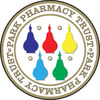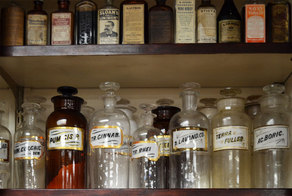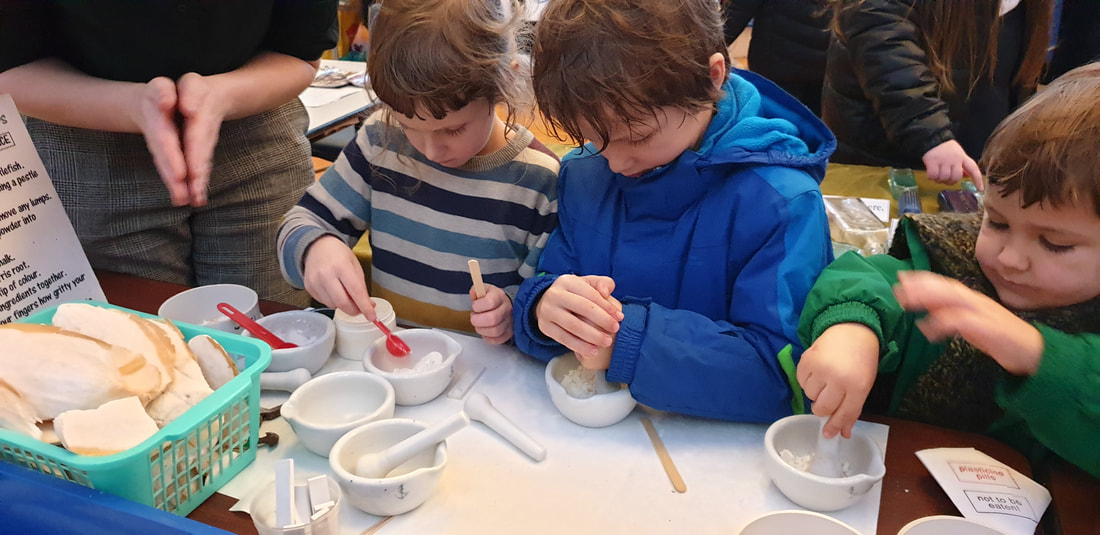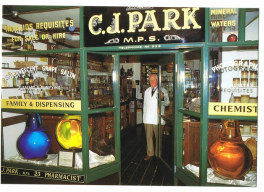Welcome to Park Pharmacy Trust
|
Our History:
Park Pharmacy Trust is a registered educational charity. Opened in 1984, the Trust received national recognition for its innovative approach to life-long learning. It pioneered recall reminiscence sessions with Age Concern and also ran award-winning hands on practical workshops for children. |
The Collections:
Park Pharmacy Trust has a large pharmaceutical library, a collection of materia medica (used in the past for making pharmaceutical preparations), an extensive collection of artefacts and old fashioned propietary goods. It also owns , a complete Victorian pharmacy, known as the Cookworthy pharmacy and the famous C J Park pharmacy, known as Mr Park's chemist shop, that until recently was in the Merchant's House Museum, Plymouth. |
Thorn Park Lodge:
Is a Victorian Park Lodge that hosts many of Park Pharmacy Trust's collection. Visiting Thorn Park Lodge is like stepping back in time; a great place to learn about old practices that helped shape today's pharmaceutical world. The lodge boasts a medicinal garden where visitors can learn about plants used for medicine. |
Learn more about our charity
Plymouth Heritage Health Science ExploratoryPark Pharmacy Trust has plans to develop the Plymouth Health Science Exploratory and is looking for a suitable location in the City Centre or Barbican/Sutton Harbour part of Plymouth.
This ambitious project brings together heritage, health, science and engineering in innovative and unusual ways while ensuring that the business elements of this project will enable the venture to be self-sustaining. The project incorporates a number of award-winning successful approaches to life-long learning and public understanding of health, science and engineering such as: Children’s Industry Workshops of which there are currently five. These are all hands-on workshops in which children learn by doing it themselves. In addition to the present five industry workshops new ones will be produced using a similar format as well as introduce some totally new features. No matter how bitter the pill the memories of it are sweet (a novel approach to recall reminiscence) and Science and non-science of herbal medicine. The exploratory will indulge peoples’ curiosity and enable them to find out for themselves. It grows from the details described in a plan for the Museum of Healthy Man. |
Provisional Topics
|
The present plan is to rebuild on the selected site the famous C J Park Pharmacy, known affectionately as Mr Park’s chemist shop, as a complete walk in shop. This was the last remaining Victorian chemist’s shop in Plymouth, established in 1864, when it closed for business the last day of 1983. It was a major tourist attraction in the Merchant’s House Museum where it was manned by Park Pharmacy Trust volunteers. There thousands of visitors could see the pharmacy, try their hand at old fashioned pill-rolling (and earn a certificate of proficiency in the art of pill rolling) and talk to the volunteer stewards on duty. A weekend event held at the Merchant’s House Museum Pharmacy is Phun, attracted record numbers of visitors. The pharmacy was televised Nationally to over 8 million viewers when Park Pharmacy Trust became the joint United Kingdom winner in the Tourism/Heritage category of the BBC’s “It’s My City!” competition. The complete pharmacy collection, furniture and contents is currently in store in Plymouth.
The trust owns a second old fashioned chemist shop, the Cookworthy pharmacy, which had been on loan to the Cookworthy museum in Kingsbridge. It is planned that this second pharmacy be used as a shop to sell many old perfumes and proprietary goods and equipment and raw materials to make cosmetics. The drug run of drawers will be stocked with many of the raw materials used in the preparation of natural products. These materia medica will be sold in the shop together with other ingredients and equipment for making, soaps, perfumes, lotions and creams. The shop will be manned by volunteers, in traditional dress, who will demonstrate the way items were weighed using two pan brass balances and then packing the dried material in paper, using traditional paper folding equipment. Demonstrating labelling, sealing with string and wax and using label wetters. Practical workshops and courses could be run in collaboration with the Society of Cosmetics Science. It will also be used to bring to life science in Plymouth at the time of William Cookworthy: apothecary, chemist, scientist, inventor, philosopher and advisor to the Navy who is probably best known for discovering China Clay. His porcelain factory was at the location of the China House pub just along from Mast House. His wholesale apothecary business, was founded in Nott Street, Barbican in 1726. However, his apprenticeship as an apothecary at Plough Court, London, which the pharmaceutical company Glaxo Smith Kline, dates their 300 year roots, might encourage GSK to have an interest in this venture. The project is a collaboration of ideas, organisations and individuals. We are looking to bring others into the consortium who can can be involved in different ways. Park Pharmacy Trust needs evidence to show that its planned Heritage Health Science Exploratory will be used by people of all ages and cultures. If you support this venture would you please write to Park Pharmacy Trust saying you support this new venture and if possible gives your reasons. The Exploratory, as described above, will include Mr Park’s chemist shop which was traded on Mutley Plain Plymouth from 1864 until 1983, as a walk in shop where visitors can see and learn about all the old items that used to be used and sold in old-fashioned pharmacies. Please write anything you like about why you support this new venture. Let the trust know if you would like to be involved in the venture or just want to be kept informed of developments. Please write to Dr Jan Knight, chairman of Park Pharmacy Trust at the address below or email: [email protected] |
Learning Aims and Objective
These will be to demonstrate aspects of the science and non-science of human life. Authoritative statements will be made about such things as diets, health cures, herbal remedies, juice diets, holistic medicine, homoeopathy…Emphasis will be on concise lucid explanations with no gobbledygook and only essential technical terms. In general, conclusions will be left to the viewer. Provision will be made for the presentation of some aspects of normal anatomy and cellular and molecular biology. Information to help understand ethical concerns over genetic modification and production of cultured cells and organs from stem cells will be easily available. And the exploratory will have a facility for recipients of research grants to communicate to the public the science behind their projects and value of their research to the world. This facility should be especially valuable to the University of Plymouth and Plymouth Marjon University.
The message, conveyed in a variety of different ways throughout the journey through the exploratory will be that science doesn’t know it all; this is the present state of experimental knowledge (not intuitive knowledge).
There is a need to provide information, generally termed ‘Health Education’ in an environment in which facts are presented and conclusions are left to the viewer. Subjects to be covered will include food and nutrition, smoking and drugs (including the socially acceptable ones such as caffeine and alcohol) diseases such as diabetes and obesity, cancers, heart disease with emphasis on prevention.
The message, conveyed in a variety of different ways throughout the journey through the exploratory will be that science doesn’t know it all; this is the present state of experimental knowledge (not intuitive knowledge).
There is a need to provide information, generally termed ‘Health Education’ in an environment in which facts are presented and conclusions are left to the viewer. Subjects to be covered will include food and nutrition, smoking and drugs (including the socially acceptable ones such as caffeine and alcohol) diseases such as diabetes and obesity, cancers, heart disease with emphasis on prevention.
Open Evening at Thorn Park Lodge and Garden
Park Pharmacy Trust is holding a drop-in open evening from 1830 on Wednesday 18 April 2018 at Thorn Park Lodge. Come and see the pharmaceutical museum and library, reminisce over items that used to be on sale in old fashioned chemist shops and have a go at pill rolling or tube end crimping. See the medicinal garden and join the Thorn Park Lodge and Garden Community Group. And learn how you can hire the lodge (or apply for grants) to run regular or one-off community meetings. The trust is thrilled at the number of young people who love the garden and hopes that they will want to form their own group to work in the garden and run events.
Read more
Read more
News: July 2016
We are excited to announce that ITV recently filmed at Thorn Park Lodge. They visited the lodge to see work done by our brilliant Polish volunteers. We are also pleased to share with you that we are going to be interviewed by Radio Devon.
Our Story: January 2016
|
Mr Park’s chemist shop is now back in Plymouth in store and the trust wants to find a home for it in Plymouth where visitors can once again reminisce with stewards on duty in the shop. It would be great if Mr Park’s chemist shop could be rebuilt in the refurbished Merchant’s House Museum in a part of the museum that was accessible to elderly people and others with disabilities. It could eventually go the new History Museum, due to be opened in 2020.
Read about the story of CJ Park's chemist shop: Click |
Fairy Tale Ending?
|
The council bid at the auction £21,000 but Martin Miller bought it for £26,500. The council pocketed the £26,500 and now are being offered the same collection free of charge. This story could have a fairy tale ending if the council were to once again work in partnership with Park Pharmacy Trust for the benefit of the whole community and enable Mr Park’s shop to once again be on display in Plymouth.
Photo Caption: Martin Miller, who bought the entire collection at auction in 2012, is seen outside the shop in the Merchant’s House. When Martin learned of the circumstances of the auction and the history behind the collection, he put the collection into the Martin Miller Foundation. |










